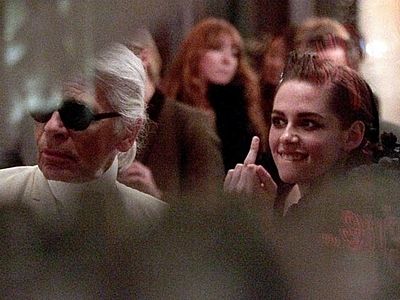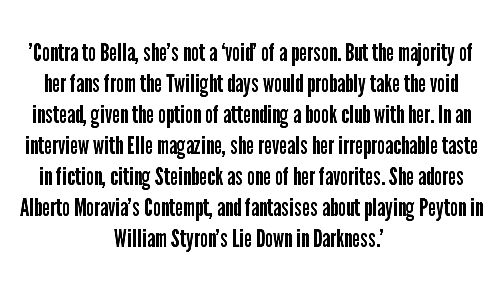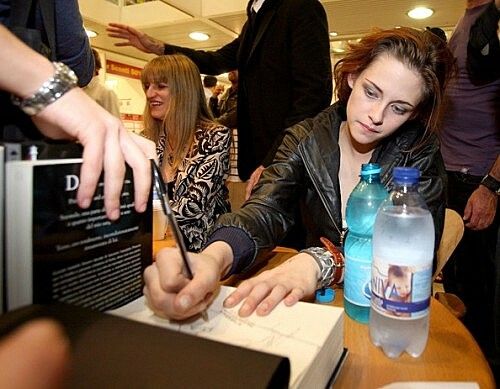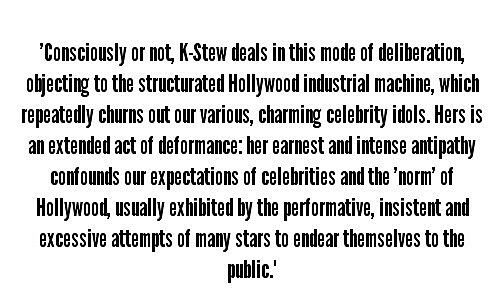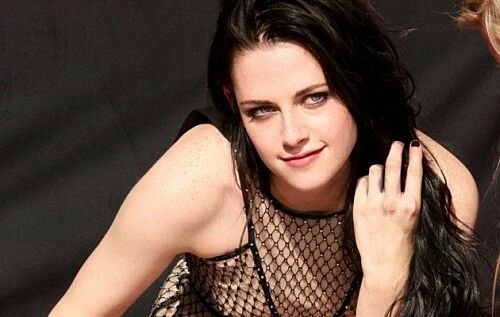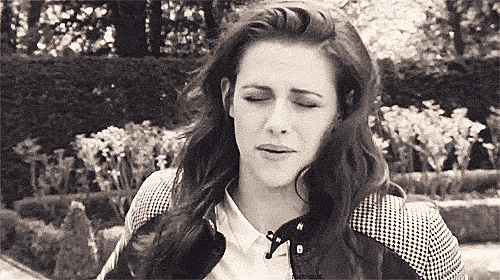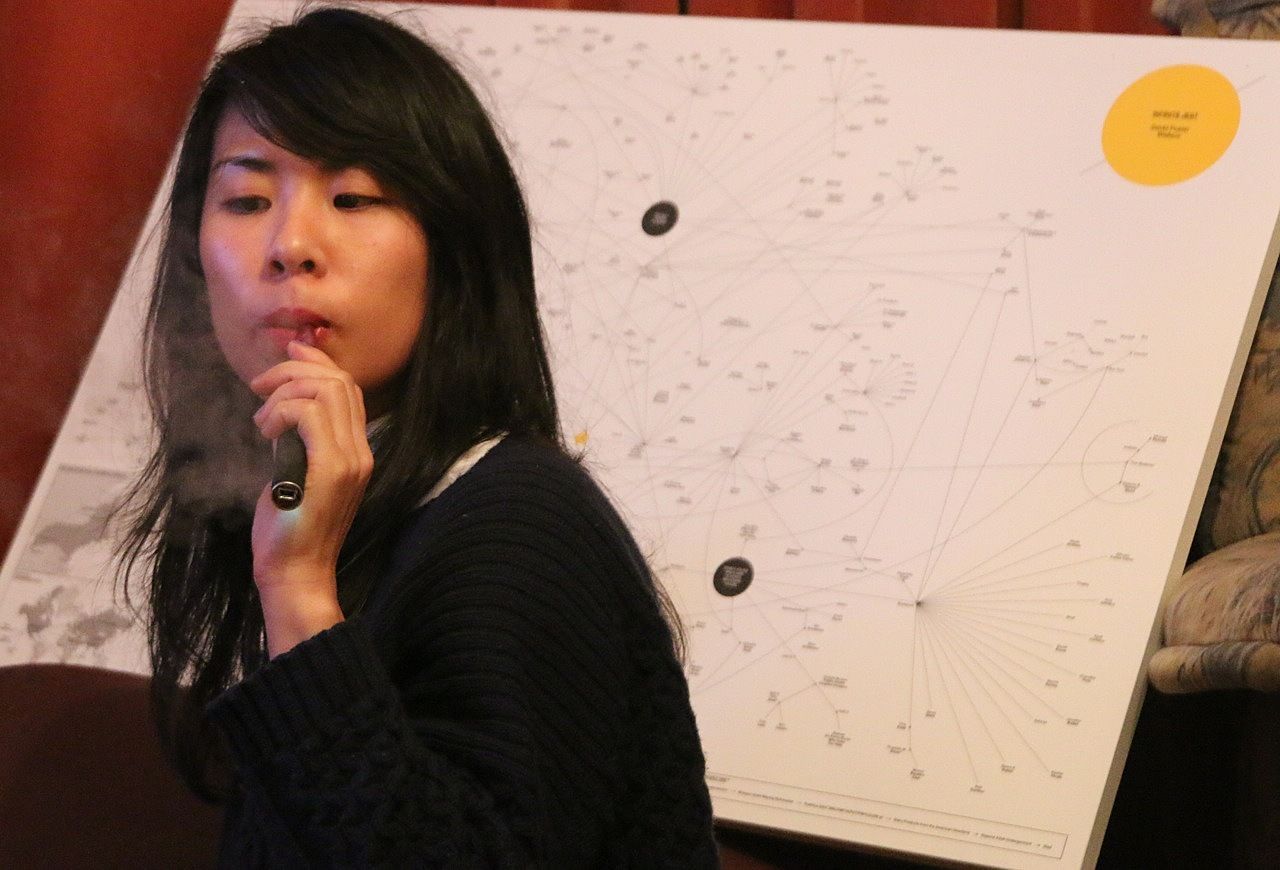Cracked Actor: The Hating of Kristen Stewart and Hollywood Deformance
Eternally brooding, a high-minded reader, and roundly despised: is Kristen Stewart obliviously awful, or is she the first female actor in decades to completely wreck what 'being a starlet' is? Soong Phoon investigates.
‘Your nature perforated the abrasive organ pumps/
Spray painted everything known to man/
Stream rushed through and all out into/
Something Whilst the crackling stare down sun snuck/
Through our windows boarded up/
He hit your flint face and it sparked. And I bellowed and you parked/’
This is an excerpt of a larger poem, an amateur effort from someone who dabbles in poetry on the side. As a former English Lit Graduate Teaching Assistant, my comments on this snippet would be framed in a sort of cautious (if slightly reluctant) praise: it triggers the senses, it’s surging with a certain urgency, features varied and surprising imagery and is really quite evocative; dare I say, it’s kind of lurid? Odd capitalisation choices, though. It would probably get a B, a reasonable if disjointed first attempt in a Stage I Creative Writing class. Before reading it, the author confessed: ‘Oh, my God...I can’t believe I’m doing this.‘
That’s fine. Sharing anything you’ve written can be therapeutic; even in rough draft form. It’s an exposure of the self - and there the matter should have ended. But people more influential than me got to have their say. On Facebook, one commentator said that her piece was ‘an abuse of words…that the dumb bitch CLEARLY got from a thesaurus’. A commenter on Entertainment Weekly’s comment section, ‘varmint kong’ wrote: ‘her poem is like one of those modern art masterpieces where a guy shoots a canvas with a paintball gun and then proclaims it a deeply personal work of conviction.’ Because this wasn’t some undergrad, gushingly pouring her heart out in the middle of nowhere, scribbling in her Moleskine diary; it was the most reviled woman in the Western world. Kristen Stewart, actress-now-authoress, brazenly resolved to reveal her poetry to the world, and the world couldn’t wait to rip it to shreds.
Though you wouldn’t know it from her appearance or even her performances, Stewart, most renowned for her leading role as Bella Swan in the Twilight franchise, is one of the most divisive figures in Hollywood. She’s usually referred to as K-Stew (or K-Spew, by her vigorously entrenched, actively hateful opposition). Sure, she has devoted, obsessive tween and middle-aged female fans (all those 'Twi-hards' beset with 'Bellamania') - but those indifferent and neutral would be surprised by her enemies - an enormous legion of intense, raging haters.
What’s the source of all this bile? We could start with the easiest nominal ‘controversy’: Stewart most infamously had an affair with director Rupert Sanders in 2012, on the set of Snow White and the Huntsmen, cheating on her Twilight/real-life boyfriend Robert Pattinson. It gets worse. Sanders had a wife of eleven years and two children, as well as nearly two decades on Stewart. His wife was ‘devastated’. The debacle ended in a divorce that has yet to be finalised.
Worst of all, it shattered the tightly-held and treasured image of Stewart the franchise film character: loyal, precociously wise in matters of the heart, faced only with a searing love triangle (featuring a totally ripped werewolf and a pale-faced vampire), which was neatly resolved. Bella never cheated on Edward and slept with his father Carlisle Cullen on a whim - never fell for the father-figure archetype with all its troubling implications.
The biggest betrayal was to the fans: the merging of identities of actors Stewart and Pattinson with their characters Bella and Edward, reinforced by their actual real-liferelationship, was something that Twi-hards subscribed to, and loved (and also something that was very good for the Twilight franchise). A loyal allegiance had been fostered by this conjoined, cinematically fictional and reality-based relationship. There had been no separation for fans between their beloved K-Stew and their intense Bellamania. For them, Stewart was Bella. And aren’t all our acting obsessions founded initially on the basis of their characters in films, for good or for ill? A friend and Twilight reader I spoke to explained her hatred: 'She came in and ruined something I loved by being a terrible actor who is dead-eyed and incapable of emoting.’ She withdrew and mitigated this comment a little: ‘This was before I realised that Bella is basically just a void of a character.'
If Bella seemed impassive but appropriately heroic when the hour called for it, K-Spew can also be called into action when provoked. On more than one occasion, she’s flipped off paparazzi, referred to them as 'rapists'. And if that seems like a form of brazen and ill-considered confidence, you should see how awkward and ill-at-ease she is when interviewed. A high-pitched current of anxiety runs throughout this interview with Conan O'Brien - and Conan is forced to over-compensate - as she nervously rocks,slowly rubs and clutches her leg whilst attempting to answer his questions, appearing much like the stereotypical representation of a catatonic.
These serve as glaring examples of ways Stewart fails to concede to the demands of being a Hollywood celebrity, in comparison to everyone's universally desired and beloved BFF, Jennifer Lawrence. Where J-Law’s awkwardness feels charming, genuine and self-effacing, Stewart simply shrugs and admits that she's a 'miserable cunt'. She seems constantly discomfited and clearly doesn't enjoy being in the public eye. Most recently, she shielded herself with an umbrella and a baseball cap to conceal herself from the paparazzi. It looked ridiculous.
This is not an article in defense of K-Spew. Instead it seeks to reposition her as one of the more complex Hollywood figures, one who doesn't present in the conventional or ‘correct’ manner and who refuses to subscribe to the crowd-pleasing expectations of celebrity. She flatly refuses to play by the Hollywood rules and gratify the usually fawning media. She has so far denied the demands on her to cultivate an appealing and consistent brand of celebrity personality, but as one commentator asserted, the results are ‘as awkward and bathetic as you’d expect.’ I don’t feel it’s her trying to develop an anti-hero personality; it’s just a sullen refusal to participate - beyond turning up on set and picking up her paycheck.
Does this explain the hatred? Even troubled former child stars have the seeming good graces to appear like they’re having a good time in public, be it Lindsay Lohan’s antics - or Drew Barrymore’s cordial and candid relationship with the Hollywood press about her experiences of abuse and addiction. Because of K-Stew’s refusal to conform and to please those guys, let alone the public, we’re left with a slightly bewildering and confusing guessing game in an attempt to decipher her, and this generally pisses us off. Worse still, whatever K-Spew is doing, she appears to take herself seriously.
Contra to Bella, she’s not a ‘void’ of a person. But the majority of her fans from the Twilight days would probably take the void instead, given the option of attending a book club with her. In an interview with Elle magazine, she reveals her irreproachable taste in fiction, citing Steinbeck as one of her favorites. She adores Alberto Moravia's Contempt, and fantasises about playing Peyton in William Styron's Lie Down in Darkness. As a reader, I appreciate her taste; it’s admirable to talk unabashedly about the novels you love, and then say ‘we’re ready to bounce’ with an armload of purchased books from the (probably financially languishing) store where the interview took place.
But to some of the readers of Elle, she probably just comes off like an insufferable, pretentious book snob, trying to impress with high-brow selections we all bet she hasn’t read. Is this yet another reason why we hate her? Do we want our celebrity idols to be anti-intellectuals, dumb, charming and relatable? Could her attempt at probing into literary intellectualism (i.e. giving poetry a shot) have also aggravated the hatred and confusion? I think it did: it equates to a step beyond the boundaries of the mostly young, popular, vapid, female celebrity that discusses only diets, film-set anecdotes, fashion and relationships, a step that we don’t seem prepared to accept.
In addition to this literary enthusiasm, Stewart seems to be a bit of a third-wave feminist, deriding the systemic sexism evident in Hollywood in reasonably blunt terms. 'It's a total “cliché”...’ she told Stylist Magazine. ‘A man in a powerful position is considered assertive, whereas a woman (in a similar position) is a “bitch”.’ While we can question the accuracy or sentiment of this statement, at least she's making a stand that’s progressive by the standards of her peers. Same with ‘cunt’, which she’s constantly dropping in interviews. But this is gratifying; why is ‘cunt’ so much more offensive, and aggression-filled than ‘dick’? It’s a reference to a feminine body part, as ‘dick’ is a reference to the masculine equivalent. It’s pure sexism (as is the way we indulge foul-mouthed tirades from our wacky Clooneys and Sheens, but balk when a woman actor cusses us out). Self-depreciating and banal though it is, Stewart is actively reappropriating the term in a legitimate way.
Most recently, most notoriously, let me return to her literary aspirations: the poem. Stewart offered up her dilettante-ish effort, which Marie Claire graciously and voraciously published - to everyone's horror and amusement. Lending it context, Stewart said: 'I don't want to sound so fucking utterly pretentious but after I write something, I go, “Holy fuck, that's crazy”’. Here’s the whole thing, unexpurgated.
‘My Heart Is A Wiffle Ball/Freedom Pole’
By Kristen Stewart
I reared digital moonlight/
You read its clock, scrawled neon across that black/
Kismetly ... ubiquitously crest fallen/
Thrown down to strafe your foothills/
...I'll suck the bones pretty.
Your nature perforated the abrasive organ pumps/
Spray painted everything known to man/
Stream rushed through and all out into/
Something Whilst the crackling stare down sun snuck/
Through our windows boarded up/
He hit your flint face and it sparked.
And I bellowed and you parked/
We reached Marfa/
One honest day up on this freedom pole/
Devils not done digging/
He's speaking in tongues all along the pan handle/
And this pining erosion is getting dust in/
My eyes/
And I'm drunk on your morsels/
And so I look down the line/
Your every twitch hand drum salute/
Salutes mine.
Pretty bad? According to The Guardian, it ‘reads like a middle-class fridge door...(it) contrives to be as almost as dazzlingly written as the Twilight novels...’ But hardly irredeemable, according to the legitimate literary critics who responded to it. The most complimentary comment was that of a prominent poet in LA, who said '”abrasive organ pumps”' could have been written by Antonin Artaud - and has some real shock value...it isn't overly freighted with expectations of what a poem should do or be. If it's “beat”, it's more Bolinas or Bernadette (Mayer) than hortatory elder beat. That first line is weird and inspired.'
I’ve personally concluded that it’s the sort of thing an undergrad poetry student would produce - unlikely to ever be published, presenting slight potential, submitted just in time to a bemused lecturer - but Marie Claire (likely to be the very first poem they’ve ever featured in the fashion magazine, or at least the first in decades) didn’t publish it for any real critical assessment. They did it simply to embarrass her, because it’s not in line with what we deem befitting for our celebrities do. Its publication and the response amounts to compounding the egregious amount of slut-shaming she received for her affair; one of the most hated women in Hollywood also fancies herself a poet, and so we gawp and gasp and sneer at the supposed hubris of her ambition to write. And when she then remarks ‘Whoa, that’s totally dope!‘ after reading it to the interviewer, it's great, because we can treat her as stupid and pretentious.
Yet with all of this, Stewart is pushing the limits and expectations of traditional 'celebrity status' along with the public consumption and objectification that accompanies it. Sometimes I wonder if she’s afflicted with an enduring form of that childhood and adolescent illness known as Conduct Disorder, where children and tweens breach the standard 'rules of society' and often 'play pranks' for prolonged periods. Or, perhaps, this is an act of 'deformance' as opposed to 'performance' (as Stewart herself has admitted to Interview Magazine, 'I'm not a performer'). Stewart wouldn’t be the first in Hollywood to go there – but she’s likely to be the first young woman to do so.
Deformance, in a literary context, is the act of deliberately misreading a text. In doing this, it’s theorised that you imaginatively uncover an 'otherness', a new reading of a literary work. Academic Jerome McGann suggests that reading a poem of Emily Dickinson backwards constitutes a form of deformance, one that produces an ‘antithetical’ interpretation and opens up new possibilities for making sense of it.
This concept can be translated to living acts, one’s everyday life; it equates to what Michel de Certeau describes as 'play' within an entrenched system, transgressive behavior which operates to both interrogate and violate the norm. In The Practice of Everyday Life, de Certeau states that this kind of play 'constitutes the resistance to the historical law of the state of affairs and its dogmatic legitimations.' In a sense, it nearly touches on the tip of the 'revolutionary’. At the very least, it operates to reveal the system at work and sabotages the structure of this system.
Consciously or unconsciously, K-Stew deals in this mode of deliberation, objecting to the structurated Hollywood industrial machine, which repeatedly churns out our various, charming celebrity idols. Hers is an extended act of deformance: her earnest and intense antipathy confounds our expectations of celebrities and the 'norm' of Hollywood, which is usually exhibited by the performative, insistent and excessive attempts of many stars to endear themselves to the public.
You don’t have to look far to find more visible examples of this in Hollywood. The recent bizarre artistic attempts of Shia LeBeouf and James Franco also seem to be in line with this mode of 'play', this deformance. Perhaps the best contender was Joaquin Phoenix, when he officially announced he was taking 18 months out in the wilderness to attempt the rap career-cum-nervous breakdown that culminated in the documentary I’m Still Here. Before the whole thing was confirmed as a hoax, director Casey Affleck stated that he hoped to demonstrate 'the disintegration of celebrity without the clutter of preconceived notions'. Even if it was all a big put-on, a prolonged show, Affleck’s statement still rang true. But what differentiates Stewart from Phoenix is that she’s never come out as a prankster, and even things like the poem are played with a straight face. We have zero consciousness of her interior and intentionality; zero knowledge of what she’s thinking or feeling. We just make approximations. In most cases, we just hate her.
We all have opinions on - I mean I do, I really do - and expectations of celebrities. We love them, we hate them, we judge them, and sometimes they disappoint us. It’s likely Stewart’s sullen weirdness and obtuse references would always have gotten her on the wrong side of the internet, but her infidelity kicked off an outpouring of vitriol from the media and public that’s been sustained to this day. A journalist friend said she was shocked by this, mainly because it was an immensely 'pedestrian thing to do'. She couldn't see why a 'director would be interested in someone virtually still a teenager, someone grimy and twitching. Especially when Charlize Theron was on the scene. It sort of feels like hearing that Tom Hanks kicks cats for fun.' For some reason, Angelina Jolie’s affair during Brad Pitt's relationship with Jennifer Aniston received none of this execratory mode of public response. If you’re simply comparing the deeds in question, it’s difficult to comprehend why.
And if we’re casting our eye back to previous stars, their dreams and dalliances, it’s worth returning to the ongoing hatred of Gwyneth Paltrow, an equally polarizing figure. It’s similarly intriguing, although she’s comfortably a generation older.
Goop (Goop!?), her 'lifestyle publication', attempts to 'curat(e) the best of lifestyle to help her readers save time, simplify and feel inspired.' But really, she's just advertising for $45,000 wardrobe items. And sure, that is pretty annoying. The Guardian calls it a 'very silly website that aches for parody with its monied rustic fantasies and inspirational monologues about fruit.' But alongside this, the author suggests that at least Paltrow, like K-Stew, 'is brave enough to venture beyond Hollywood's accepted script for women.' So when these female celebrities do this, why does it incite such venomous, social responses? Famous people have stacks of cash, and there’s a strange, oscillating outlook on the prestige of their running of businesses. What should separate Gwyneth Paltrow’s Goop from Paul Newman’s Own or Kevin Costner’s casino in South Dakota? Nothing, really. Is it just pure sexism?
Unlike Paltrow, K-Stew has taken a more significant gamble in venturing beyond the accepted script for women by trying to follow her literary aspirations rather than her financial ones, and it’s part of what makes her a more fascinating, enigmatic figure than we perceive her to be. She's certainly not an incompetent or undirectable actress; she has adequately, even impressively, demonstrated her capacity to act in Adventureland, Into the Wild, and early on in Panic Room.
But whether or not it’s premediated, She adamantly refuses to be mere functionary of the Hollywood, press-coached celebrity machine. She isn't sporting the dream life; she used to drive a shitty old run-down pick-up truck (now upgraded to a Mini Cooper that Lindsay Lohan pokes fun at). She wore norm-core clothes before norm-core was a thing , continues to tell photographers that they're 'pieces of shit that don't deserve the same air' that she does with a sort of unconvincing and mannered rage. This hodge-podge of hostility and awkward twitchness is a publicist’s disaster. And she writes poetry. Sorta. So I’ll stake the claim that she’s actually a ‘deformance’ artist.
If not, the sense that she’s not faking, Twi-harding to be something she’s isn't, is pretty refreshing. If we’ve all missed the joke, it’s okay, because she doesn’t seem to care what we think. It’s an attitude we could all benefit from adopting. My heart is a wiffle ball for you, K-Stew.

